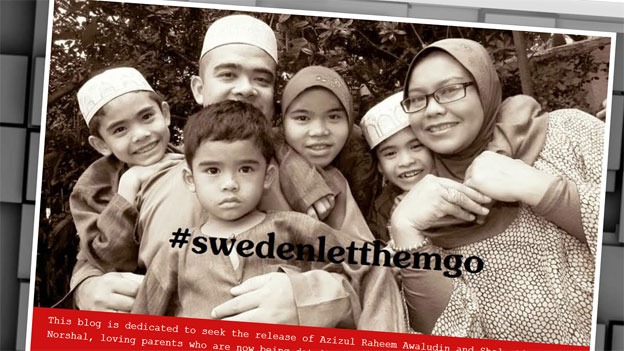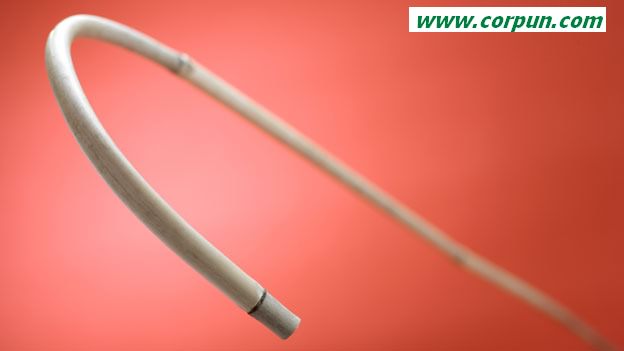|
Corpun file 25233 at www.corpun.com
BBC News, London, 5 April 2014Malaysia's love for the cane is questionedBy Jennifer Pak
Just over a week ago a Malaysian husband and wife were jailed by a Swedish court for smacking and caning their children. The case, which began with their arrest in December, has led some Malaysians to wonder whether they rely too much on corporal punishment. "This is what one of the children called a rotan," said prosecutor Anna Arnell, producing a cane in the Stockholm courtroom. "In Malaysia it is a whip used to discipline children in school and at home." Her words prompted "looks of confusion and shock" in court, according to Malaysian newspaper The Star. The youngest son of the couple in the dock, seven-year-old Arif, had earlier been seen in a video recording saying that his father had pinched him on the arms, while his mother had hit him with a coat hanger and a "stick with a knot at the end". This was the rotan, or rattan. Malaysians would not find these statements shocking. In fact, Malaysian tourism and culture minister Mohamed Nazri Abdul Aziz used almost the same words as the prosecutor when, in January, he urged the Swedish authorities to show leniency. "In Malaysia it's common to scold or cane our children a little now and then," he said. Each country has its own culture and its own ways of bringing up children, he added. These contrasting attitudes also came into sharp focus when the second of the couple's four children, Ammar, estimated that he was beaten more than 1,000 times per year, for such things as playing loud music instead of doing homework, fighting with his sister, or misbehaving when he was meant to be reading the Koran with his mother. When he went on to say that he "deserved the spankings" the policewoman interviewing him interjected that in Sweden corporal punishment has been illegal since 1979. In other words, no child in Sweden ever deserves a spanking.
Malaysians have tended, on the whole, to sympathise with the parents -- Azizul Raheem Awalludin, a director with Tourism Malaysia in Stockholm, and his wife, Shalwati Norshal, who pleaded not guilty but were jailed for 10 and 14 months respectively. But there have been dissenting voices. The debate was fuelled by two other recent stories, in which teachers were accused of meting out harsh punishments. In February, a teacher in the northern Malaysian state of Perak allegedly punched four teenagers and left them bleeding -- apparently for spilling water and forgetting a school book. He had been subject to similar violent outbursts in the past, it was reported, and yet had been allowed to continue teaching. A few weeks before that, another teacher in the same state had forced two primary students to wear bells around their necks like cows, and threatened to cane them if they didn't eat grass as punishment for not completing their homework. The education ministry called the punishment "extreme" and "excessive" but in the end the teacher was only given a warning and transferred to another school. An editorial in the New Straits Times responded to this second case with an editorial headlined "Treat kids as fellow humans", saying the public and official reaction "should be an indication of where children stand in the grand scheme of Malaysian society". "No-one has yet suggested that the teacher be charged for child abuse or sacked, or at least suspended," it went on. But parents waiting children outside one secondary school in Kuala Lumpur showed little sign of outrage over this case. Many said they grew up with similar treatment. One father, Abdul Rahman, remembered that a teacher had forced him to run round the field in his underwear after he forgot to bring his shorts to school for PE. "It was a good lesson," he said, laughing.
James Nayagam of the Malaysian Human Rights Commission says parents tend to support caning in schools because they want their children to do well academically. Corporal punishment is entrenched in society, he says. And the parents outside the school in Kuala Lumpur once again back this up, most admitting to disciplining their children by smacking them or pinching their arms. One man said his parents had thrust raw chillis into his mouth, as a child, for telling a lie, while a mother, Carol Soh, said her father had tied her to a tree so she could not run away when he caned her. But Mrs Soh added that unlike her parents she would always talk to her children first if they misbehaved and would cane them only as a last resort. So perhaps attitudes are slowly changing. The Swedish case, meanwhile, has given rise to articles suggesting that the Swedish ban on corporal punishment has spawned a nation of "brats". "Our children cannot totally emulate the West," wrote columnist Chok Suat Ling. "Asian rules of decorum must never be disregarded." Children needed to respect their elders and authority, she argued. While she expressed her support for the Convention on the Rights of the Child, she noted that most parents thought "several lashes" from a cane was the most effective way to keep bad behaviour in check. Reports that Azizul and Shalwati had smacked at least one of their four children for not performing prayer, resonated with some in Malaysia's majority Muslim community. "We have to hit our children if they do not pray," said one mother-of-two, Siti Hajjah. But at the same time, many Malaysian parents recognise that strong laws to protect children are in principle a good thing.
The Malay Mail online newspaper criticised some other media outlets for "spinning the story as one of Malaysian parents being victimised by a Scandinavian country that is overly focused on protecting child rights" saying they should be more focused on "obtaining justice for these helpless children". And there are some in Malaysia who want an end to all corporal punishment, such as Sharmila Sekaran of the advocacy group, Voice of the Children. She argues that physical discipline often gets out of hand, and has long-term psychological effects. She has met Malaysians, she says, who struggle to care for their elderly parents because they still harbour resentment from the punishment they received as a child. "There are other avenues, and it's just easy because children are small and they can't fight back -- it's easy to get physical with them," she says. But she admits her view is not shared by most Malaysians. BBC © 2014 |
About this website |




